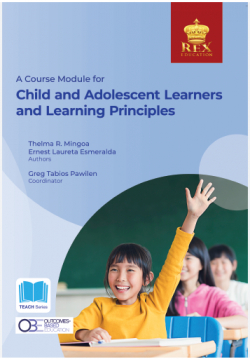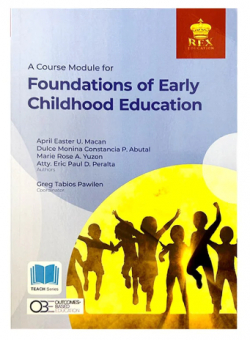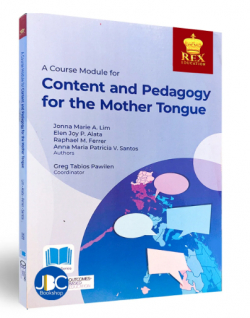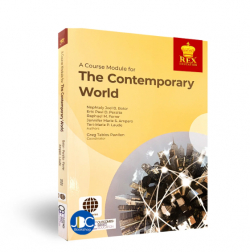A course module for child development
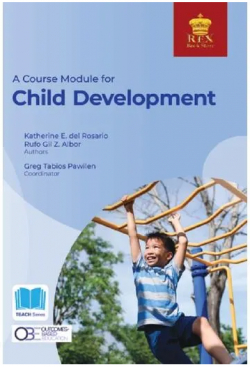
Buy online ($)
Type
Book
Authors
del Rosario ( Katherine )
Albor ( Rufo Gil )
ISBN 13
9786210421668
Category
Filipiniana-Circ.
[ Browse Items ]
Publication Year
2021
Publisher
Rex , Philippines
Pages
vi, 203 p. : ill.
Subject
1. Child development. 2. Child psychology.
Abstract
Child development emerged from a desire to respond to the need of aspiring Early Childhood educators to be grounded on the fundamental facts about human development. We recognize that the first years of life contribute significantly to children's quality of life and eventually as individual members of the society. Numerous researchers confirmed how crucial it is to view children from a well-balanced perspective. The concept of the "whole child" came about by looking at and putting equal weight on the different domains, such as the physical-motor, socio-emotional, cognitive, and moral development of children.
This module has been conceptualized in accordance to the program goals set for the students taking Bachelor of Early Childhood Education (BECEd). It aims to educate early childhood practitioners working with children from zero toe eight years old in different settings, such as the home, school, and community.
Every lesson in this module is written such a way that readers can easily understand. Learning objectives are clearly defined; lessons are precisely introduced; and the contents are both comprehensive and informative. Each lesson also gives readers the opportunity to reflect on their own personal experience as children and future educators. To summarize each lesson's inputs, readers are expected to specify the key learning points they discovered as they journey throughout the whole lesson.
The first unit of this module introduces to its readers the basic principles of child development, highlighting how children are viewed in various era and context. The second unit investigates the research component that equips readers with essential skills and methods used in studying the different areas related to children. This is a crucial component in child development due to its compliance to ethical standards in research involving children.
The third unit explores principal theories which serves as guides for readers to understand the development of children based on observations, experiments, and discourse done by key people in the area of psychology and human development.
The fourth and fifth units are lengthy discussions on how children develop from the moment of conception to birth until age eight. Factors that affect growth and development and the unique characteristics of children in each ag group are examined using the developmental domains lens.
This module concludes in the sixth unit as it presents a specific group of children who undergo a typical development. It summarizes the common exceptionalities among children as well as interventions and support that can be implemented to address their particular needs.
It is our goal to make a positive contribution to the readers of this module, as well as to the development of children they will someday educate, counsel, study, and/or parent. We hope that this module will equip its readers with knowledge and skills to make them better educators and address challenges children of the present generation are facing in their daily lives.
-The authors
This module has been conceptualized in accordance to the program goals set for the students taking Bachelor of Early Childhood Education (BECEd). It aims to educate early childhood practitioners working with children from zero toe eight years old in different settings, such as the home, school, and community.
Every lesson in this module is written such a way that readers can easily understand. Learning objectives are clearly defined; lessons are precisely introduced; and the contents are both comprehensive and informative. Each lesson also gives readers the opportunity to reflect on their own personal experience as children and future educators. To summarize each lesson's inputs, readers are expected to specify the key learning points they discovered as they journey throughout the whole lesson.
The first unit of this module introduces to its readers the basic principles of child development, highlighting how children are viewed in various era and context. The second unit investigates the research component that equips readers with essential skills and methods used in studying the different areas related to children. This is a crucial component in child development due to its compliance to ethical standards in research involving children.
The third unit explores principal theories which serves as guides for readers to understand the development of children based on observations, experiments, and discourse done by key people in the area of psychology and human development.
The fourth and fifth units are lengthy discussions on how children develop from the moment of conception to birth until age eight. Factors that affect growth and development and the unique characteristics of children in each ag group are examined using the developmental domains lens.
This module concludes in the sixth unit as it presents a specific group of children who undergo a typical development. It summarizes the common exceptionalities among children as well as interventions and support that can be implemented to address their particular needs.
It is our goal to make a positive contribution to the readers of this module, as well as to the development of children they will someday educate, counsel, study, and/or parent. We hope that this module will equip its readers with knowledge and skills to make them better educators and address challenges children of the present generation are facing in their daily lives.
-The authors
Description
Contents:
Unit I: Introduction in child development
Unit II: Research in child development
Unit III: Theories in child development
Unit IV: Prenatal to infant development
Unit V: Developmental domains of children
Unit VI: Children with exceptionalities
Unit I: Introduction in child development
Unit II: Research in child development
Unit III: Theories in child development
Unit IV: Prenatal to infant development
Unit V: Developmental domains of children
Unit VI: Children with exceptionalities
Biblio Notes
Notes:
Includes bibliographical references and index.
Includes bibliographical references and index.
Number of Copies
5
| Library | Accession No | Call No | Copy No | Edition | Location | Availability |
|---|---|---|---|---|---|---|
| Main | 570 | Fil-C. HQ750 .A1 D45 2021 | 1 | Filipiniana Section | Yes | |
| Main | 571 | Fil-C. HQ750 .A1 D45 2021 | 2 | Filipiniana Section | Yes | |
| Main | 572 | Fil-C. HQ750 .A1 D45 2021 | 3 | Filipiniana Section | Yes | |
| Main | 573 | Fil-C. HQ750 .A1 D45 2021 | 4 | Filipiniana Section | Yes | |
| Main | 574 | Fil-C. HQ750 .A1 D45 2021 | 5 | Filipiniana Section | Yes |
